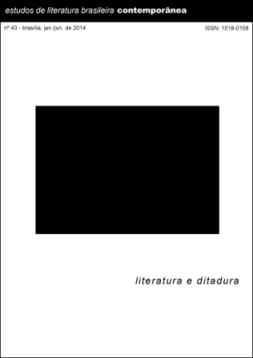Memórias manchadas e ruínas memoriais em A mancha e “O condomínio”, de Luis Fernando Veríssimo
DOI:
https://doi.org/10.1590/S2316-40182014000100005Resumen
Este artigo propõe que locais esquizofrênicos da memória ”“ locais construídos como palimpsestos de várias (e muitas vezes contraditórias) versões do passado ”“ estão conectados com o que o antropólogo James Holston (2008) denomina de “cidadania diferenciada”. O artigo estabelece uma analogia entre os direitos diferenciados da memória e as disposições constitucionais que legalizam as diferenças sociais e civis e que, segundo Holston, são uma das características da cidadania diferenciada.
Referencias
ABRÃO, Paulo; TORELLY, Marcelo D. (2012). Resistance to change: Brazil's persistent amnesty and its alternatives for truth and justice. In: LESSA, Francesca; PAYNE, Leigh A. (Eds.). Amnesty in the age of human rights accountability: comparative and international perspectives. Cambridge: Cambridge University Press.
AGAMBEN, Giorgio (2005). State of exception. Chicago: University of Chicago Press.
ARENDT, Hannah (1951). The origins of totalitarianism. New York: Harcourt, Brace and Co.
ATENCIO, Rebecca (2014). Memory’s Turn: reckoning with dictatorship in Brazil. Madison: University of Wisconsin Press.
AVELAR, Idelber (1999). The untimely present: postdictatorial Latin American fiction and the task of mourning. Durham: Duke University Press.
BAUMAN, Zygmunt (2004). Wasted lives: modernity and its outcasts. Oxford: Polity.
BRASIL (1979). Lei 6.683, de 28 de agosto. Concede anistia e dá outras providências. Disponível em: <http://www.planalto.gov.br/ccivil_03/leis/L6683.htm. Acesso em: 10 mar. 2014.
CALDEIRA, Teresa P. R. (2000). City of walls: crime, segregation, and citizenship in São Paulo. Berkeley: University of California Press.
CANO, Ignacio; FERREIRA, Patricia S. (2006). The reparations programs in Brazil. In: GREIFF, Pablo (Ed.). Handbook of reparations. Oxford: Oxford University Press.
COMITÊ CARLOS DE RÉ. Disponível em: <http://comitedaverdadeportoalegre.wordpress.com>. Acesso em: 20 mar. 2013.
DECLARAÇÃO UNIVERSAL DOS DIREITOS HUMANOS. Disponível em: <http://portal.mj.gov.br/sedh/ct/legis_intern/ddh_bib_inter_universal.htm>. Acesso em: 05 mar. 2013.
GINZBURG, Jaime (2010). Escritas da tortura. In: TELES, Edson; SAFATLE, Vladimir (orgs.). O que resta da ditadura: a exceção brasileira. São Paulo: Boitempo.
HITE, Katherine (2011). Politics and the art of commemoration: memorials to struggle in Latin America and Spain. New York: Routledge.
HOLSTON, James (2008). Insurgent citizenship: disjunctions of democracy and modernity in Brazil. Princeton: Princeton University Press.
JELIN, Elizabeth; REIN, Judy; GODOY-ANATIVIA, Marcial (eds.) (2003). State repression and the labors of memory. Minneapolis, University of Minnesota Press.
LAZZARA, Michael J.; UNRUH, Vicky (2009). Introduction: telling ruins. In: LAZZARA, Michael; UNRUH, Vicky (Eds.). Telling ruins in Latin America. New York: Palgrave Macmillan.
MARSIGLIA, Ivan (2012). E o direito à memória bateu à porta. O Estado de S. Paulo, São Paulo, 26 ago. Caderno Aliás. Disponível em: <http://www.estadao.com.br/noticias/impresso,e-o-direito-a-memoria-bateu-a-porta,921878,0.htm>. Acesso em: 10 mar. 2014.
MEZAROBBA, Glenda (2010). Between reparations, half truths and impunity: the difficult break with the legacy of the dictatorship in Brazil. Sur - Revista internacional de direitos humanos, São Paulo, v. 7, n. 13, p. 7-25.
MITCHELL, José (2007). Segredos à direita e à esquerda na ditadura militar. Porto Alegre: RBS.
O’DONNELL, Guilermo et al. (1986). Transitions from authoritarian rule. Baltimore: Johns Hopkins University Press.
PIOVESAN, Flávia (2010). Direito internacional dos direitos humanos e lei de anistia: o caso brasileiro. In: TELES, Edson; SAFATLE, Vladimir (orgs.). O que resta da ditadura: a exceção brasileira. São Paulo: Boitempo.
PROGRAMA NACIONAL DOS DIREITOS HUMANOS (PDH) (2010). Disponível em: <http://portal.mj.gov.br/sedh/pndh3/index.html>. Acesso em: 09 mar. 2014.
RANGEL, Carolina (2013). Vingança é o objetivo. Veja, São Paulo, 29 mai. p. 76-78.
SIKKINK, Kathryn (2011). The justice cascade: how human rights prosecutions are changing world politics. New York: W. W. Norton & Co.
SIKKINK, Kathryn; WALLING, Carrie B. (2007). The impact of human rights trials in Latin America. Journal of peace research, Oslo, v. 44, n. 4, p. 427-445.
UNESCO Office in Brasilia. Human rights in Brazil. Disponível em: <http://www.unesco.org/new/en/brasilia/social-and-human-sciences/human-rights>. Acesso em: 10 mar. 2014.
SCARRY, Elaine (1987). The body in pain: the making and unmaking of the world. New York: Oxford University Press.
STERN, Steve J. (2006). Battling for hearts and minds: memory struggles in Pinochet’s Chile. Durham: Duke University Press
TEITEL, Ruti G. (2000). Transitional justice. Oxford: Oxford University Press.
VERÃSSIMO, Luis Fernando (1982). O condomínio. In: Outras do analista de Bagé. Porto Alegre: L&PM.
________ (2004). A mancha. São Paulo: Companhia das Letras.
WILCKEN, Patrick (2012). The reckoning. Investigating torture in Brazil. New left review, London, n. 73, p. 63-78.
Descargas
Publicado
Número
Sección
Licencia
Los autores que publican en esta revista concuerdan con los siguientes términos:
a) Los (los) autores (s) conservan los derechos de autor y conceden a la revista el derecho de primera publicación, siendo el trabajo simultáneamente licenciado bajo la Licencia Creative Commons de Atribución-No Comercial 4.0, lo que permite compartir el trabajo con reconocimiento de la autoría del trabajo y publicación inicial en esta revista.
b) Los autores (a) tienen autorización para asumir contratos adicionales por separado, para distribución no exclusiva de la versión del trabajo publicada en esta revista (por ejemplo, publicar en repositorio institucional o como capítulo de libro), con reconocimiento de autoría y reconocimiento publicación inicial en esta revista.
c) Los autores tienen permiso y se les anima a publicar y distribuir su trabajo en línea (por ejemplo, en repositorios institucionales o en su página personal) después del proceso editorial, ya que esto puede generar cambios productivos, así como aumentar el impacto y la citación del trabajo publicado (ver el efecto del acceso libre).
d) Los (as) autores (as) de los trabajos aprobados autorizan la revista a, después de la publicación, ceder su contenido para reproducción en indexadores de contenido, bibliotecas virtuales y similares.
e) Los (as) autores (as) asumen que los textos sometidos a la publicación son de su creación original, responsabilizándose enteramente por su contenido en caso de eventual impugnación por parte de terceros.


